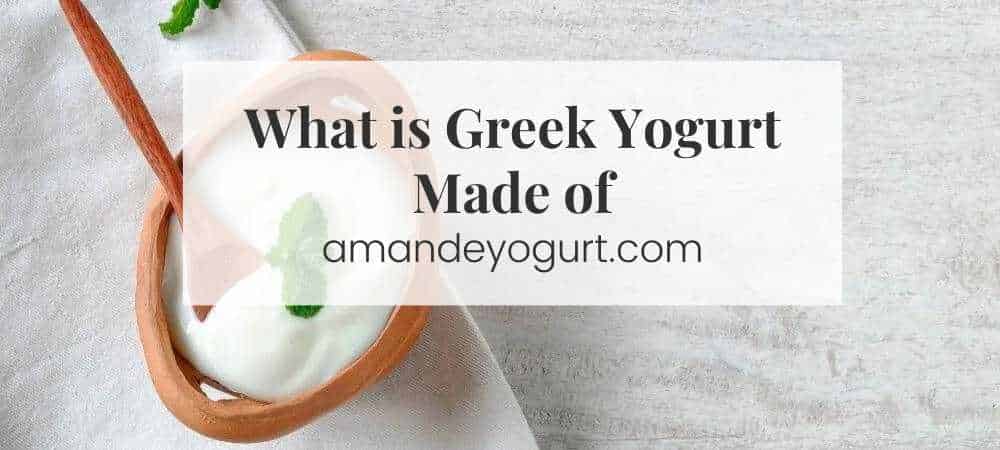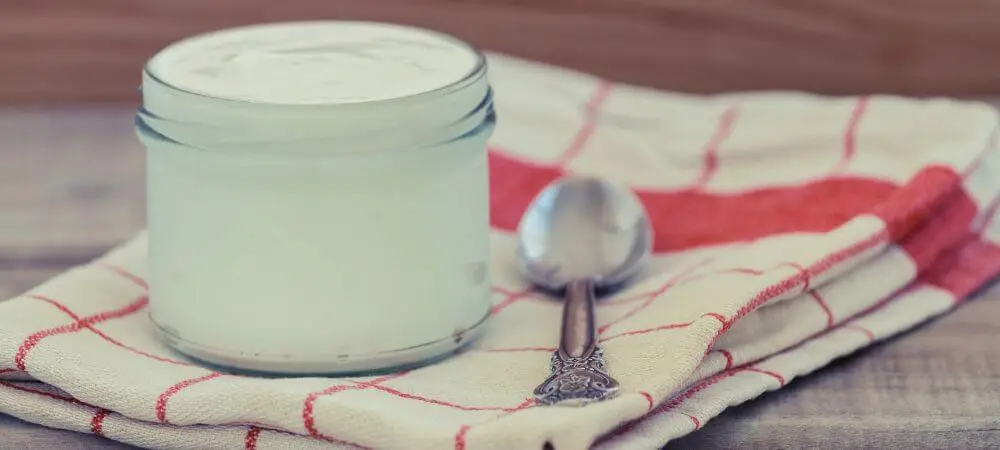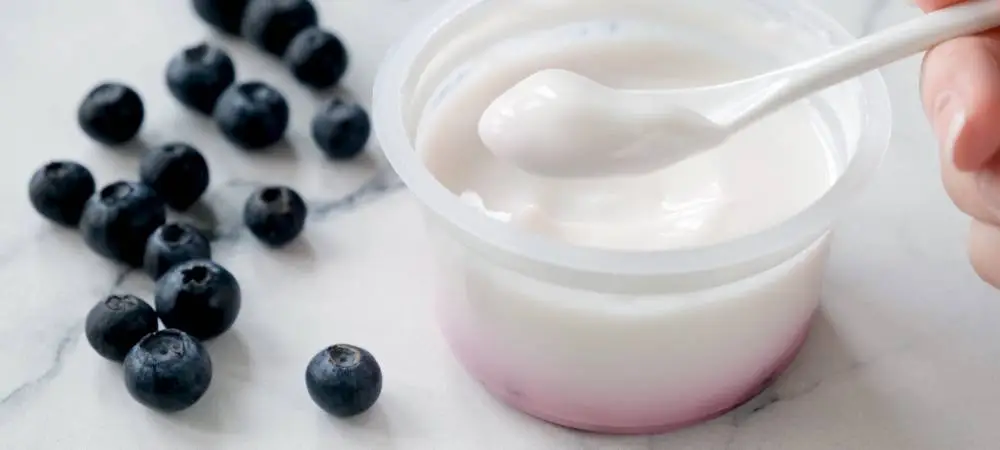Greek yogurt is a type of cultured dairy product that has become very popular over the last decade or so. The popularity of Greek yogurt has increased significantly since its introduction into the American food market. There are several types of Greek yogurt available today, each having their own unique taste and texture.
But What is Greek Yogurt Made Of?
Greek yogurt is a thicker version of regular yogurt. It contains live cultures that aid in digestion, boost immunity, and promote overall health. Greek yogurt is also low in fat and high in protein. In addition to being delicious, Greek yogurt is also a great source of protein, calcium, and potassium.
| Do you know, that straining yogurt is common in the Mediterranean and the Middle East. |
Greek yogurt is what you get after straining the regular yogurt and removing whey from it. The yogurt results in has a firmer texture and more protein concentration. Labneh is another super-strained yogurt which is one step ahead of Greek Yogurt. In this, yogurt is strained prolonged to get super-thick consistency like cream cheese.
How Greek Yogurt is Made?
The process used to make Greek yogurt is similar to that of regular yogurt. However, there are some additional steps involved with making Greek yogurt. For example:
1) Milk must be pasteurized before it can be processed into Greek yogurt. This step kills off any harmful bacteria present in milk.
2) It is then heated up to 110 degrees F for 30 minutes. During this time, the temperature of the milk rises. As the temperature increases, the lactose (milk sugar) breaks down into lactic acid which makes the yogurt tangier.
3) After heating, the milk is allowed to cool back down to around 80 degrees F. At this point, the lactic acid produced by the bacteria will begin to thicken the milk.
4) After pasteurization, the milk is cooled down to about 40 degrees F. This slows down the growth of bacteria in the milk.
5) Next, the milk is inoculated with Lactobacillus bulgaricus and Streptococcus thermophilus. These two bacteria work together to produce lactic acid during fermentation.
6) Finally, the mixture is kept in the yogurt maker or a pot that maintains the requisite temperature for bacterias to outgrow resulting into yogurt. Keep it for 8-10 hours it becomes thick and creamy.
7) The final product is strained through cheesecloth to remove excess whey. Whey is the liquid left after the curds have separated from the solids.
What is the Difference Between Regular Yogurt and Greek Yogurt?
There are many differences between regular yogurt and Greek yogurt. One of the significant difference between Regular Yogurt and Greek Yogurt is of ‘Whey’. While the whey is present in Regular yogurt, the removal of whey turns the regular yogurt into greek yogurt.
The whey removal leads to significant difference in the nutritional value of Yogurt. Some of these include:
• Greek yogurt is higher in protein than regular yogurt.
• Also, it has thicker consistency due to whey removal.
• Did you knoe, Greek Yogurt has lesser calories.
What Is Greek Yogurt Made From?
Greek yogurt is made from cow’s milk. It is not made from sheep’s milk like traditional yogurt. Greek yogurt is often referred to as “cultured milk” because it is cultured using special strains of bacteria as Stretococcus thermophilus and lactobacillus.
Greek yogurt tastes much different than regular yogurt. While both contain live cultures, Greek yogurt has more lactic acid than regular yogurt. This gives Greek yogurt a tart flavor.
Due to whey removal in Greek yogurt reducing its volume, you require more milk to make the same amount of Greek Yogurt than the regular yogurt. Traditional methods of Greek Yogurt require straining up to 3 times to get the desired consistency. The use of centrifuges is prevalent in modern methods of making greek yogurt at commercial levels.
We can say, Greek Yogurt is generally made up of skimmed milk by adding the bacterial strains of S. Thermophilus and Lactobacillus Acidophilus. Often commercial Greek Yogurt comes with added thickeners and preservatives to achieve its desired texture.
Can I Make Greek Yogurt At Home?
Yes! You can easily make Greek Yogurt at home. There are many Greek Yogurt Makers available that simplify the process with the addition of a mesh strainer in them.
The process as we discussed above is relatively simple. The added advantage of Homemade Greek Yogurt is that it is free from preservatives, thickeners, and other additives, unlike commercial Greek yogurt.
If you are buying Greek Yogurt from the market, check its labels. There are many Greek Yogurts that come with additional thickeners and sugars that disqualify them from being the healthiest yogurts as touted by most Greek Yogurts.
Why Should I Eat Greek Yogurt?
Greek yogurt is an excellent choice when you want something healthy but still crave something sweet. Greek yogurt has fewer calories than regular yogurt. It also provides your body with beneficial probiotics. Probiotics are living organisms that help maintain good gut health. By consuming Greek yogurt regularly, you may notice improvements in your digestive system.
Which is the best Greek Yogurt Brand?
Chobani is incredibly popular for its wide variety of Greek Yogurt. In fact, the brand has made its mark by introducing some of the finest Greek yogurts on the market. Look for non fat Chobani Greek Yogurt that comes with just 90 calories and 4 g of sugar.
It is worth noting that most flavored Greek Yogurt contains added sugars and you should avoid them if you are looking for a low-calorie yogurt.
Greek Yogurt Benefits
Here are some of the incredible health benefits of Greek yogurt:
• Improves Digestion
Probiotic-rich Greek yogurt helps improve digestion by helping feed friendly bacteria that reside in our intestines. When we eat foods rich in probiotics, they help keep the digestive tract clean and free of harmful microorganisms.
• Helps Prevent Yeast Infections
Yeast infections occur when there is too much yeast in the body. Probiotic-rich Greek yogurts help prevent yeast infections by keeping the intestinal tract clean.
• Promotes Weight Loss
Research shows that people who consume high amounts of probiotics tend to lose weight at a faster rate than those who don’t. The high protein content keep you full for longer and helps with eating less, leading to a calorie deficit.
• Boosts Immunity
Studies show that probiotic-rich Greek yogurt can boost immunity. It is an excellent source of minerals and vitamins such as zinc, riboflavin and magnesium. As yogurt is specifically rich in protein , it aids the healthy immune function.
• Lowers Cholesterol Levels
According to research conducted on mice, probiotic-rich Greek Yogurt may lower cholesterol levels. Greek yogurt leads to lower cholesterol and triglyceride levels that helps in reducing cardiovascular disease risk.
Conclusion
There are many reasons why you should try out Greek Yogurt. The fact remains that it is one of the easiest ways to add probiotics into your diet. If you are looking for a healthier alternative to dairy products, then Greek Yogurt is a great option. It is low in calories and has high probiotics count. So go ahead and give it a shot!
Frequently Asked Questions
Is Greek Yogurt Made Up of Bones and Bugs?
Not Greek Yogurt is made up of bones and bugs, but the thickeners added to Greek Yogurt such as Gelatin to make it thick are made up of boiling the animal’s bones, ligaments, skin, and tendons, according to PETA.
What is the healthiest Yogurt to Eat?
The healthiest yogurt should be lowest in the sugar. Infact, there should not be any added sugar in it. Look at the labels to confirm that they should not contain any additives or harmful preservatives. Also, check it should have the lowest calories and have few traces of saturated fats.
Is Yogurt Full of Bugs?
No! The yogurt has live culture probiotics that aid your digestion. Although, some yogurt like Yoplait Original Strawberry Yogurt uses Carmine as dye which is the extract from the Cochineal insect’s pulverized body. This process is perfectly natural.
What is the main ingredient in Greek yogurt?
The main ingredient in Greek yogurt is milk, specifically, cow’s milk or sometimes goat’s milk. The yogurt is then strained to remove the whey, resulting in a thicker, creamier consistency compared to regular yogurt.
Is Greek yogurt dairy or non dairy?
Greek yogurt is a dairy product since it is made from milk.
Is Greek yogurt good for your gut?
Greek yogurt is good for your gut, as it contains live active cultures (probiotics) that promote a healthy balance of gut bacteria, supporting digestion and immune function.
Is it good to eat Greek yogurt every day?
It is good to eat Greek yogurt every day as part of a balanced diet, as it is a nutritious food high in protein, calcium, and probiotics. However, it’s essential to choose unsweetened or low-sugar options and consider portion sizes to maintain a balanced diet.











